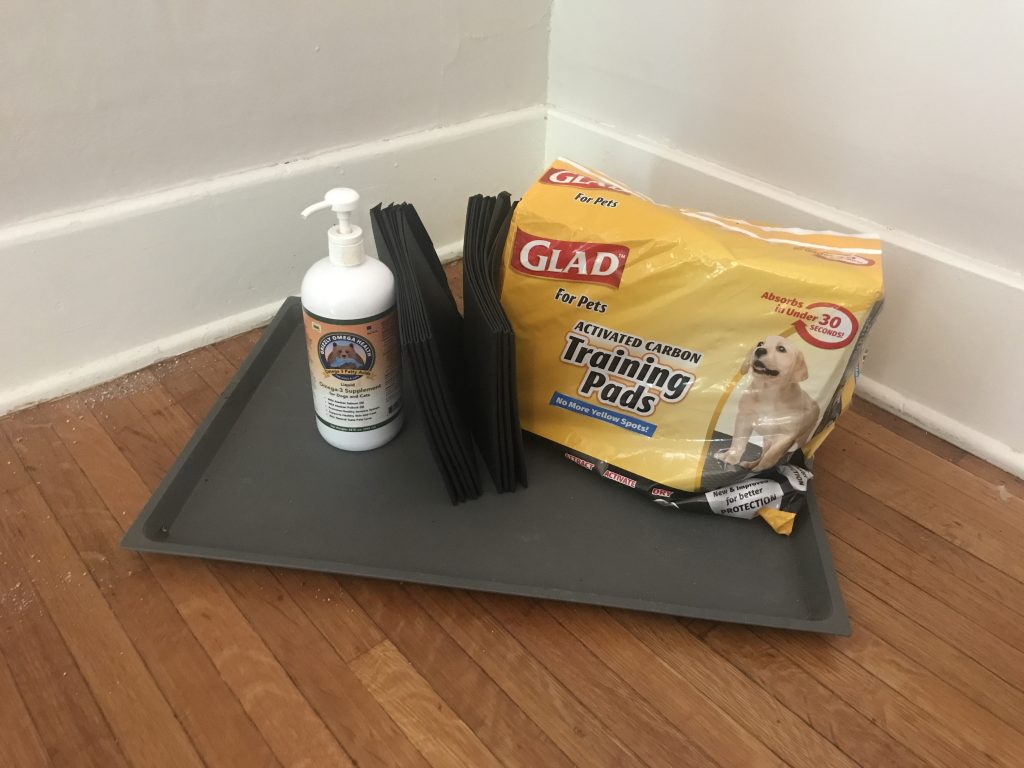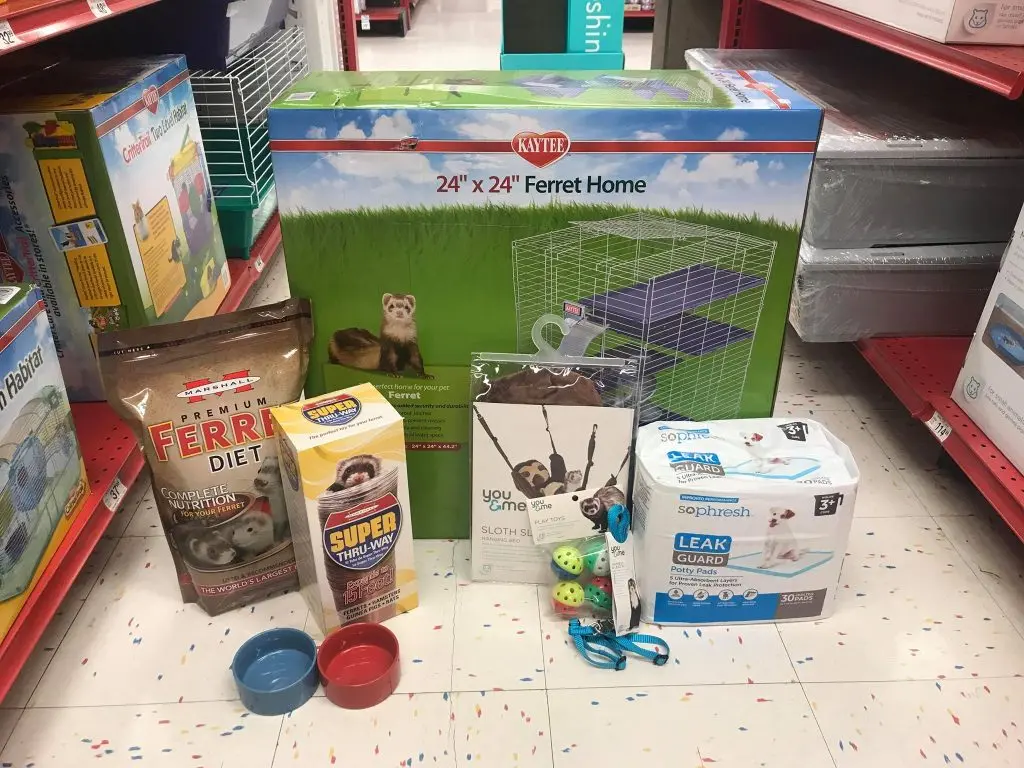Jump to Section:
Yes, ferrets are cute, funny, intelligent, loving, and incredibly unique. But there are also many cons of having a ferret. Are you SURE you want one for a pet? In this blog, I’m about to get into the nitty-gritty, expensive, heartbreaking, surprising, and smelly parts of ferret ownership to help see if this pet is for you! I’ll answer all your questions, such as ‘Are ferrets easy to take care of?’ ‘Are ferrets dirty pets?’ ‘Are ferrets good pets?’ and much more.
If you’re new to my site, my name is Haley and this is Part 2 of my Pros and Cons of Ferrets as Pets series. If you haven’t already read it, check out Part 1, where I discuss ferret ownership’s many benefits.
- One of the cons of ferrets: They are escape artists
The first con of owning a is a rebuttal to the first point I made in my last blog. When it comes to ferret intelligence, specifically in problem-solving, ferrets rank somewhere around small primates. And YES though it IS incredible to see them figure stuff out like the little Einsteins they are, this also means they are bound to figure out things you wish they wouldn’t, like how to open doors, how to get to the food they shouldn’t, and how to hop over gates meant to keep them safe.
So, that also means unless you take extreme measures to ferret-proof your entire living quarters, your ferret will likely end up escaping or injuring themselves. Ferrets can end up inside your walls, inside your recliners, behind your cabinets, and under your doors.
Also, just because you ferret-proofed for one ferret doesn’t mean it will work for another. I hardly had to ferret-proof anything when I first got Moose. But when Newt came along, I had to rethink everything after he scaled my balcony fence and jumped off.
I have an extensive series of videos I made specifically on ferret-proofing your house room by room, so check that out.

- Another con of owning ferrets: They get bored easily
There’s another downside to ferret intelligence. They get bored quickly. This is not the type of pet you can lock in a cage all day with the same toys and hope they will be okay. You must provide ample room to play and rotate the enrichment items you give so they don’t develop stress behaviors.
Many people have asked me on social media, ‘Do ferrets need a friend?’ The answer is yes, ferrets require regular interaction throughout the day. If you don’t have the time for that, this isn’t the pet for you!
- Not all ferrets love to cuddle :”(
A lot of people ask me, ‘Are ferrets friendly?’ The answer is all ferrets love to play, which is fantastic, but not every ferret likes to cuddle. Some people will adopt a ferret with the expectation that their ferret will be SUPER cuddly on day one and then be disappointed when they are not.
Though there ARE things you can do to bond with your ferrets and get them more interested in snuggling with you, some ferrets never become big cuddlers. Moose was a huge cuddler, and Albert is becoming one as he gets older, but Newt would always rather investigate a room than sit with me. And that was okay.
- Ferret nips: When furry friends get feisty
Now let’s get to the question, ‘Do ferrets attack humans?’ Ferrets can have many cute behaviors like war dancing and speed bumping. But they exhibit other behaviors that some people might find annoying, tiny children. Many younger ferrets (and older ones, too) like to nip when they play. And if they want you to join them, they might nip you too. Many times, ferrets don’t know how hard they can bite a human, who has much thinner and more sensitive skin than their furry brothers and sisters. This behavior becomes a big pain point for many new ferret owners.
I have a video on ferret biting and advice on how to train your ferret not to bite so check that out.
- They are mini thieves in disguise
Another potentially annoying thing ferrets do is steal personal items. This could include your phone, your wallet, and your tv remote. If you’re in no rush, you may find this funny, but if you are running late, it might start to be a severe nuisance, trying to locate all your ferret’s stashes around the house in search of your car keys so you can get to work.
- They may get a tad annoying
Once a ferret decides they want to get somewhere, it will dedicate its entire existence to accomplishing that goal until they meet it. It’s inspiring. A closed door often looks like an open one to your ferret -if they can scratch long enough. If they can’t figure out how to wiggle their way under it, your ferret will try their best to dig a trench into fitting through. And if you have carpet, this results in mangled, bald spots next to your bedroom doors – so you probably need to get your deposit back.

- Ferrets are foes with smaller pets
Ferrets can make great companions to you and your dog or cat under the proper supervision. However, keeping ferrets with other animals like rats, mice, hamsters, guinea pigs, chinchillas, birds, and reptiles is not a good idea. Your ferret is an obligate carnivore, and even though it might not seem like it to you, it has evolved to hunt. Keeping prey animals nearby can be highly stressful for these other small animals and could result in a deadly accident.
Now BEFORE I GET to the biggest complaint we get regularly about ferrets, which is the biggest universal con of ferret ownership, my name is Haley and I create entertaining and educational content about ferrets. If you’re enjoying this article, subscribe to our weekly Ferret Feature Newsletter to enjoy the special stories of the ferret owners in The Modern Ferret community.
- Ferrets poop a lot
Alright, ready for this? The biggest complaint I have seen from the global ferret community is…. Their poop! It’s runny, it’s smelly, and it is plentiful. Ferrets poop a lot, and it’s not the first time I’ve said it!
Why is this? Well, ferrets have a relatively fast metabolism and may poop every 3-4 hours. And if you have multiple ferrets in one house, that adds much poop.
Ferrets are also obligate carnivores, so they don’t have little rodent poops that are small, formed, and odorless. Instead, ferrets produce something more like loose dog poop -in terms of smell and shape -but luckily not in terms of size!
And try as we might, even the best-trained ferrets still need to find reasons to miss their litter box, resulting in stained carpets (aka lost deposits) and ruined socks. Sometimes ferrets will even start their business too high and dirty your baseboards. Yeah. True story.
My ferrets also seemed to revolt whenever I slacked on cleaning their litter boxes, which led to the discovery of many new ferret-selected potty corners.
I learned that if you want your ferrets to stay potty trained, you must constantly clean up their potty areas! But if you’d like to learn how to minimize accidents, check out my video on potty training your ferret.
- Health problems
Unfortunately, ferrets seem to suffer from serious health problems like insulinoma, adrenal disease, mast cell tumors, helicobacter, ear mites, and enlarged hearts -to name a few. My three ferrets became sick with many of these things, and taking care of them became very difficult for many reasons. If you want to hear about that experience, click here.
Health problems are expensive (costing hundreds a year to treat), heartbreaking (because some of them are very long-suffering, like insulinoma), and time-consuming (with medications that need to be given every 3-4 hours in some cases).
If you are seriously thinking about ferrets, becoming aware of these animals’ most common illnesses and diseases is crucial to be financially and emotionally prepared.
- Beware of their mischief & mishaps
In addition to contracting or inheriting various illnesses, ferrets are prone to get hurt.
According to Ferrets for Dummies, intestinal and stomach blockages are the leading cause of death in ferrets under 2 years of age. Ferrets love to chew on and swallow lots of things they shouldn’t, and because they love to weasel their way into forbidden places in your home, it’s hard to prevent this risk 100% of the time.
Ferrets also love to run under and between our feet when we walk, so getting stepped on (or sat on) is another common cause of injury.
This means you might have to take some last-minute trips to the vet!

- May be hard to find a vet
And that leads me to the next downside of ferrets. Finding a vet who can treat your ferret correctly is very hard. Many vet clinics are strictly dog and cat-focused. For some reason, ferrets fall into the ‘exotic’ category, even though they are becoming more common, narrowing the number of available vets even more.
I remember speaking with my vet a while back, and she suggested I buy 3 specific books. One was Ferrets for Dummies, and the other two were medical, veterinary textbooks. She said, “Read these, and you will know more about ferrets than most trained vets.”
Luckily we’ve made an in-depth guide on what to look for when choosing a vet for your ferret. It also includes a list of 60+ trusted ferret vets, provided by our community. So check it out.
- Limited products
Because ferrets are less popular than dogs and cats, there are fewer options for food, treats, and enrichment. Many big box stores sell unhealthy or unsafe items marketed for ferrets too, and first-time ferret owners usually need to learn better.
It takes time and research to select the best stuff for your ferret, and it can be challenging because, just like the products, learning resources at this time is still limited.
- Ferrets will cost you serious money
If you want to contain your ferret for any period, you will need a cage, and suitable ferret cages are expensive. Good ferret food is pricey, depending on whether you feed high-quality kibble or a raw prey diet.
Vet care becomes more expensive as ferrets age because they frequently need annual implants to treat their adrenal disease or twice-daily medication for insulinoma.
This is a costly pet. Here is a detailed cost-breakdown of ferret ownership which will give you a clear picture.
- Traveling with ferrets is a fur-midable challenge
There are not many places that board ferrets. Perhaps more are popping up, but these things cater more to dogs and cats.
That means you’re either going to need to bring your ferrets with you when you travel (which means finding a hotel or Airbnb that will allow them and then ferret-proofing that space) or leaving them with a trusted friend who is comfortable changing litter boxes multiple times per day, feeding them a potentially special diet like raw prey meat and giving them twice daily medication if they are sick.
When a friend watched my ferret, I remember being so scared they might step on them sleeping in a pile of clothes or accidentally leave the door open and let them escape.
Because I can be a little extra, I made signs for his apartment and put them on the floor, saying, “Step lightly! There could be a ferret sleeping under these clothes!”

- You may loose them sooner than you think
I covered ferret lifespan in the pros section of this series, but depending on your preference, a ferret’s typical lifespan of 5-7 years could be a big con for you. The bond you form is profound, and frequently the time we get to spend with them here on earth doesn’t seem long enough.
That same vet from before once told me there are two types of ferret owners -those who have ferrets for life and those who do ferrets just once and then decide they can’t handle the heartbreak again. They get sick so often, and they are gone too fast!

- Not legal everywhere
A last one I thought I’d quickly mention – ferrets are not legal everywhere. I know in the United States, ferrets are still banned in California and Hawaii. There are also some cities and other countries where ferrets are illegal. This would be something to consider if you plan on moving during your ferret’s lifespan.
Conclusion- What are the cons of having a ferret?
I would not describe ferrets as easy pets. Would some ferret owners in the comment section agree with me?! They are time-consuming, expensive, messy, they love to steal, they CAN be smelly, and they CAN get sick -but for some people, it’s all worth it. Even after reading this article, that may be you. Make sure you are prepared for this kind of commitment, time-wise, financially, and emotionally. And when in doubt, first join an online community like The Modern Ferret and start talking to real ferret owners about their experiences!
I hope this video series sheds some light on what it’s ACTUALLY like to have ferrets -the good, the bad, and the smelly! Please let me know what you thought in the comments, and if this was weasily the best thing you’ve seen all day, make sure to follow our Instagram & Youtube for more fun ferret stuff. See you soon!





